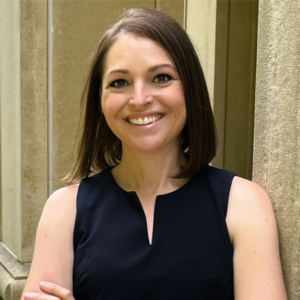
Melissa Little, PhD, MPH
Fourteen independent community pharmacies will team with UVA Health to help residents of rural Appalachia quit smoking and test the effectiveness of multiple smoking cessation programs, including one based on text messaging. The project ultimately aims to lower the region’s cancer rates, which are among the highest in the country.
Backed by more than $5 million in funding from the National Cancer Institute, 14 pharmacies selected for the program in Virginia, Kentucky, North Carolina, West Virginia and Tennessee will participate in the study.
“It is clear that publicly available smoking cessation resources are not reaching residents in this region,” said Melissa Little, PhD, MPH, a researcher in the UVA School of Medicine’s Department of Public Health Sciences and the leader of this initiative. “We are hoping that by working with local community pharmacies, we’ll be able to help more smokers interested in quitting who otherwise may not have sought help with their quit attempt.”
The Impact of Smoking in Appalachia
Rural Appalachia has some of the highest smoking rates in the United States. For example, an analysis of data from 2015 to 2019 found the smoking rate in rural Appalachian counties was 20.9%, compared with a statewide smoking rate of 13.3%. Higher rates of cancer in rural Appalachia can be attributed to smoking, Little said, as studies have shown that cigarette smoking is estimated to account for 30% of all cancer deaths and 90% of all lung cancer deaths.
However, residents of rural Appalachia are less likely to take advantage of commonly available resources to quit smoking – such as phone counseling and nicotine-replacement therapy – which Little suspects may be due to the shortage of healthcare providers in the region.
She believes community pharmacists based in rural Appalachia are ideally positioned to help residents quit smoking.
“We conducted a small demonstration study in partnership with Gates Pharmacy, a community pharmacy in Mt. Airy, N.C., to determine the feasibility of the approach,” Little said. “Overall, the project was well received by both participants interested in quitting as well as the Gates pharmacists and technicians.”
“The process of recruiting and enrolling patients was simple, the intervention guides were clear and easy to follow, and our entire staff was able to contribute in their own way to the success of the project,” said Hayley Wood, the pharmacy manager at Gates Pharmacy.
The program will evaluate the effectiveness of different combinations of smoking cessation programs. All 768 participants will receive nicotine replacement therapy through gum, a patch or both.
Additionally, participants will be randomly selected to participate in one of three programs:
- QuitAid:Participants will have one in-person meeting and five follow-up sessions by phone over a month with a pharmacist, who will provide support and help address any questions or concerns about the nicotine-replacement therapy.
- Tobacco Quitline:Participants will have four 20- to 30-minute phone calls over four weeks from a trained tobacco treatment specialist working on the project to assist them in quitting smoking and preventing relapse.
- SmokefreeTXT:A text messaging program developed by the National Cancer Institute that sends participants three to five text messages per day for seven weeks to assist participants in quitting and preventing relapses.
For More Information
The study is expected to begin in April 2023. Pharmacies and smokers interested in the program can learn more by emailing Quitaid@hscmail.mcc.virginia.edu or by calling study coordinator Taylor Reid at 434.924.8894.
Article written by Eric Swensen, Public Information Officer, UVA Health. Contact Eric about this story or to share your own research.
